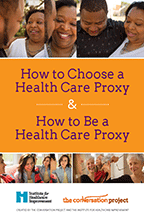
ADVANCE CARE PLANNING: Begin Exploring | Choices / What Matters | New Paths | Choose Agent
Create Directive | Share | Store-Revise | Peace & Grace
When it Matters Most – Who Will Be Your Advocate?

We all experience stormy times in our lives. Some give us warning. Others arrive as a sudden crisis. Before you develop a serious illness or experience a sudden medical emergency it is wise to designate a person who will speak for you, advocate for you, and make critical medical decisions for you if you cannot make them for yourself.
Selecting that person now, talking with them about what matters most to you at the end of your life is a gift you give yourself and your loved ones.
What is a Health Care “Proxy” / Agent ?
The person you designate to make medical decisions for you is acting as a health care “proxy”. There are three different types of “proxies”:
Health Care Agent (and Alternate Agent)
Agent is a common term used for your medical decision maker. Most all Advance Directive forms have a space where you can officially designate the name and contact information for your Agent.
Agent is the term you will find used on this website It is vital to designate someone as your Agent, and ideally, to choose at least one or more others who can serve in this capacity if your designated Agent is not available or is unable to serve at the time you need it.
Surrogate
An informal assignment of a person – usually a family member, but possibly a close friend when no one has been designated as an Agent. The choice of who will serve as surrogate is usually made by the medical team caring for you in an emergency. Formally assigning an person as your Agent is a more reliable way of insuring that your values and wishes for care are followed.
Conservator or Guardian
A court can appoint a person as a conservator or guardian to make medical decisions for another person. This is more commonly done to insure care for a person with long term mental disabilities. The court process can be lengthy. If a conservator or guardian is appointed, that person must answer to the court for any medical decisions made for another.
Different from choosing a Financial Power of Attorney
A health care Agent has different powers from the person you designate to take care of your financial matters if you are unable to do so. The person who has General (financial) Power of Attorney has no authority to make your medical decisions. Some people choose the same person to make both medical and financial decisions, but this is not common as the skills needed are often very different.
Let your Agent know that you have named them in your Advance Directive
It is important to discuss the serious decisions you are asking your Agent to make on your behalf with the person you designate. You want to be sure that they are wiling to be an advocate for YOUR values and preferences and to work with medical professionals to make the best choices possible in sometimes difficult situations.
Deciding Who Will Speak for You
 How to Choose a Health Care Proxy & How to Be a Health Care Proxy
How to Choose a Health Care Proxy & How to Be a Health Care Proxy
The Conversation project provides this helpful and user friendly guide to choosing the right Agent (proxy) for yourself and making sound decisions as an agent. Free download.
Download it free HERE
What is Decision-Making Capacity and Who Decides?
Even as you choose and name the person who will speak for you at a future time when you cannot speak for yourself, the powers you grant your health care Agent become effective only when it is determined that you cannot make choices for yourself, that is, you lack medical decision making capacity either temporarily or permanently.
Who Decides?
You make have the capacity at one moment during a serious illness or medical emergency, but lapse in and out a state where you need someone to speak for you. Temporary incapacity to make medical decisions is often determined by the physician caring for you at the time you experience life-limiting or life threatening condition.
The determination of longer term or permanent incapacity, as may be the case in advanced stages of dementia or Alzheimer’s, would be more likely to be made by your primary care physician. You can designate who can make such a determination in your Advance Directive.
A few individuals choose to have their Agent begin making medical decision for them right away even if they have capacity simply because they do not want to make complex medical decisions any longer.
How do physicians determine whether or not you have the capacity
to make medical decisions for yourself?
Generally the following four conditions are considered:
1. Can a patient clearly indicate their coice of the treatment options available?
2. Can a patient understand the meaning of the information communicated by a physician?
3. Can the patient understand their medical condition and the consequences of the treatment options?
4. Can the patient think / reason rationally in order to make an informed choice?
Here are a couple of article if you want to learn more about decision making capacity.
Assessing Decision-Making Capacity
– an article by Alvin H. Moss, MD
The Center for Health Ethics and Law, West Virginia University
What Determines Your “Capacity” to Make Health Care Decisions? The authorities and powers you give your health care Agent become effective only if it is determined that you can not make choices for yourself. In medical terms it is viewed that you lack “capacity” to make medical decision for yourself. You will find other helpful guides on their website.
Learn more
Decision Making Capacity
Vermont Ethics Network
An excellent overview from an ethics organization in Vermont. Many other end of life resources
Learn more
How to Be an Effective Agent
 Making Medical Decisions for Someone Else – A How to Guide
Making Medical Decisions for Someone Else – A How to Guide
Harvard medical School provides this free download document that will not only give you ideas about how to bean Agent but can also be used as a guide for how to effectively advocate for yourself in health care.
Download it free HERE
 Giving Someone the Power of Attorney for Your Healthcare
Giving Someone the Power of Attorney for Your Healthcare
In many states the designation of this person can be made in a separate document generally titled Power of Attorney for Health Care. The current trend is for states to allow this designation to be made as part of your Advance Directive to simplify maintain your choices in one document. If you wish to keep this designation as a separate document. A lawyer is not needed to complete this form. The Commission on Law and Aging of the American Bar Association has released a booklet offering a simple durable power of attorney for health care, designed to meet the legal requirements in nearly all states. Learn more and download their free guide from the ABA website.
Download it free HERE
Who Can Access Your Medical Information?
If you have a diagnosis of a serious illness or condition of frailty or you have a terminal illness, you may wish to be certain that your Agent is officially authorized to have access to your health information so that they can speak for you and advocate for you knowledgeably. The HIPPA rules govern who may have access to your records. Having access to medical information about your state of health will assist your Agent in making the best choices for you and to act effectively on your behalf in medical claims etc.
It is ideal to sign a separate HIPPA Release Form giving your Agent access to your health information. This signed form needs to be on file in your primary care physician’s office, and and other treating physicians or care facilities. Keeping a copy of singed HIPPA releases with your Advance Directive may help your Agent when she or he must make important choices for you end of life care. .
HIPPA National Health Information Privacy Rules
HIPPA is not an end of life directive, but rather it is a comprehensive US government policy that gives you the right to have access to your healthcare records. The policy also defines who else may have access to your records and how that information may be used. Generally, your Agent will need to have access to your health records at a time when you lack capacity.
You usually sign a HIPPA form each time you see a new doctor, use a new pharmacy, are admitted to a hospital or emergency room, sign up for a health care insurance plan, enter a residential or assisted living care facility etc. To learn more go to these internet links: